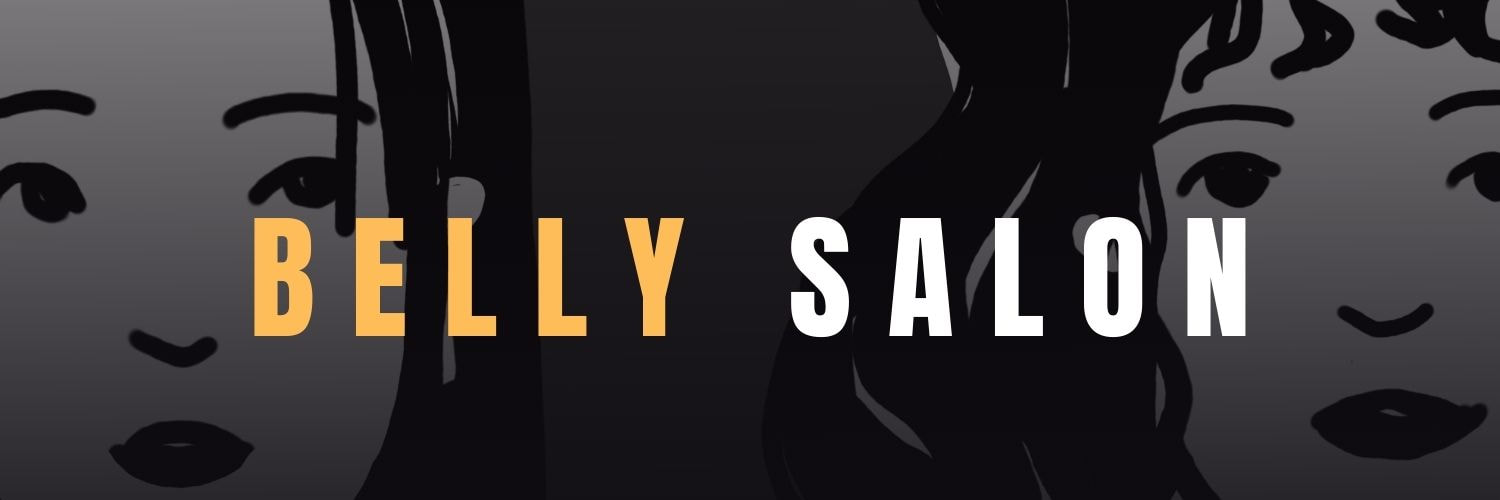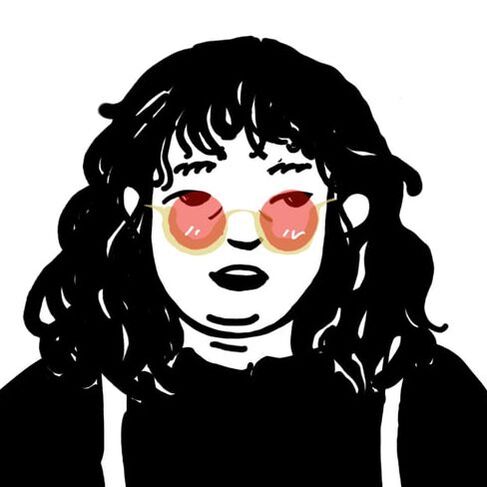By Muchen Wang
|
Morning news.
The morning news is on at 5:49 am. That’s when I hear my mother walking around the apartment along with the sound of the television in the living room. She sets a kid stool in front of the sofa chair, as well as a bowl of water slightly warmer than room temperature and a hairbrush, combs, hair pins, and scunchies on the wood and glass coffee table in front of the television. I sit there on my stool, listening to the obvious sound of the news, the less obvious static noise from the old-time speaker and screen, and the even less obvious sound of the ceiling’s fluorescent lights—all before I’m even awake. This is when my mom does my hair. She dabs the water before she combs it in my hair. She says it will help the hair “unify.” The water takes my hair by surprise. Before my hair can fight to curl back up, the thin, hard, black, invisible-in-my-black-hair hairpins pin it to my scalp. On the news, I keep hearing the word “老百姓”—the three characters mean “old” (in a chummy way), “hundreds of,” and “family names.” In the news, these together mean “civilians.” My mother teaches me how to read and write later than the other children. She thinks I’ll have a better experience in school if I enter it empty-headed. I learn to write my name on my own, but backwards and mirrored, maybe because I am left-handed. At four-years-old, other kids can recite ten Tang poems. Or at least how to count to a hundred. Some can name different fruits in a second language. But by the time I enter grade school, I know only about three Chinese words. One of them is “Mulan,” because my mother bought me that Disney DVD, and Mulan kind of sounds like my name. My mother laughs when she sees that I write or read or pick up random words I know nothing about from the news (as well as anything else, from car plates to neon signs), but she never pressures me to actually learn anything. “Ma-ma-” I say. “老百姓 are so pitiful!” They must have it hard, I think as I watch the news stories. Why else are they always so happy when they get free grade school access? Why would they be so cheerful when the military gives them food? So happy when there is a new highway? Civilians must have it hard: no school, no food, no roads. My mom doesn’t know why I make this “pitiful” comment about civilians when I watch the news report. I don’t think she watches the news during my hair time. She only cares about the traffic and the weather forecast. “Ma-ma-” I say. “We should do something to make 老百姓 lives better.” My mother laughs as she brushes my bangs. “Chen, that’s great. But we are civilians too.” My mom once had coupons so I could get a discounted cornrow braid. The following two weeks were the best two weeks for her, be-cause she didn’t have to wake up to do my hair during the morning news. “No, but we’re not!” I say. Are we civilians? I’m not happy being referred to as a word on a news report... instead of myself. “Chen, do you actually know that word?” “Yes Ma-ma-,” I say. “It means people-s and people-s who are n-o-t us.” “Yes! We, are civilians.” No, I am not, I think. I don’t remember when I learned that yes, I am a civilian. I belong to a group summed up by one word. Impossible stubborn curly hair. We do different hairstyles on different days. Sometimes I decide which hairstyle—if I am awake in time. This is rare for four-year-old me. I like two ponytail bundles on each side. That way, when I arrive at kindergarten, I can see the ponytails in the mirror at the gate. If my hair is only a single ponytail behind my head, I can’t see it in the mirror. So my mother has to zig my hair from the middle, roughly fix one side just to keep the zig separated while we really work on the hair. Then she does the water combing on the other side. When that side is all pinned, fixed, and upped, we go back to the rough side to repeat the process. When my hair is fixed, it is the closest it will be to looking like the other middle, inland, Han-ethnicity, Chinese girls who go to kindergarten in the morning. Sometimes I have to do a jokey bit. It happens at the end of the week, after my mother picks me up from kindergarten and we go to the food market. We wear our hair down—natural. Because no matter how much water combing and brushing we do in the morning, in the after-noon my hair gives out. No pins or scrunchie can hold it in anymore. The joke happens when an older lady—she might have a crazy, machine-permed head—approaches me. “Aren’t you too young to get your hair permed, little girl?” or “Where did you get that perm, little girl?” My mother is busy, focusing on products. But I think my mother might actually be pretending. Because she doesn’t know how to cook! We buy whatever the farmers sell to us. Later, as she washes and chops and stirs, my father critiques what we bought. I tell the older lady, “Yes, Old Auntie, but I got a perm anyway,” or maybe, “Ask how I got my perm.” “How?” the older lady says. “In my mother’s belly!” She laughs every time at that line. Sometime she follows up with, “Oh, I thought that would be painful for a little kid like you... to get a perm!” or “Wow, you are a natural curl,” or “Your baba must be a Xinjiang-er right? My neighbor is a Xinjiang-er. They have hair just like yours!”After a few times of this happening, I wonder if I can keep up the joke, using the same lines. I try to keep my enthusiasm so none of the three people involved—Mom, Old Auntie, and me—will feel awkward. Because some stranger is judging my mom for “giving her child a perm." What Chinese are you? I try to do the same water combing process when I’m older and enter grade school. It is way harder than it looks. I can’t work fast enough to surprise my hair. It always fights back and curls even harder, and I end up going to school with a messy ponytail. Kid strangers touch all the fuzzy, perm-like curls on my forehead. (There’s this one annoying kid who runs away really fast, so I cannot tell him off). It feels like this has been going on forever and will continue on forever. Thankfully, I only have to deal with this for a few more years. Years pass and I look a little older, old enough to be the go-to-the-hair-salon-on-my-own age, without strangers coming up to my mom and judging her for “perming her child’s hair.” My hair starts to grow down instead of growing out and up. My small city starts to have more jobs and investments that attract people from all over China—even the world. I notice more ethnicities besides Han: Han-Jewish descendants, called “Yehude” in Kafeing city, and Han-Muslim called “Hui.” But I only know this because they tell me their ethnicity, either in that phase when we are getting to know each other, or because they are shop owners who sell me their special snacks. I don’t feel as alone when I see a few curls around their ears. There are different ethnicities and nationalities in my home city. I don’t have to do that belly salon bit or receive unwanted attention. However, every summer when I go back to my home city, I sometimes still get a few “Are you Chinese?” followed by, “What Chinese are you?” It haunts me for a while. Did I dress wrong? Should I wear my hair differently? Is it because of my size? My skin complexion? I reply with a polite smile. “Well, yes, yes I am; yes I was born and raised in this neighborhood. In fact I never left this district.” (This is a lie, because they are strangers). And then I smile at their shocked awkwardness, and I wait until they give me food or an ice-cream cone or a bag of groceries. In the United States, I have had plenty of practice answering this kind of question—thanks to Uber rides. “What Asian are you?” Over and over, for seven years. I still give a smile that won’t flip. I don’t have a 4.91 Uber rating for nothing. I know I love my hair. Or at least until maybe the next wave of hating myself comes around again. I’m just really glad I don’t have to hear myself tell the belly salon joke with that upbeat cute voice to a stranger anymore. That jokey bit won’t be upbeat or cute on a 25-year-old Chen. |
|
Muchen is a cartoonist, artist, and writer. She was born and raised in a small city in central China. She tells stories with paint and words. She and her dog live in Chicago. Instagram @muchenwang07 | www.MuchenWang.com
|





